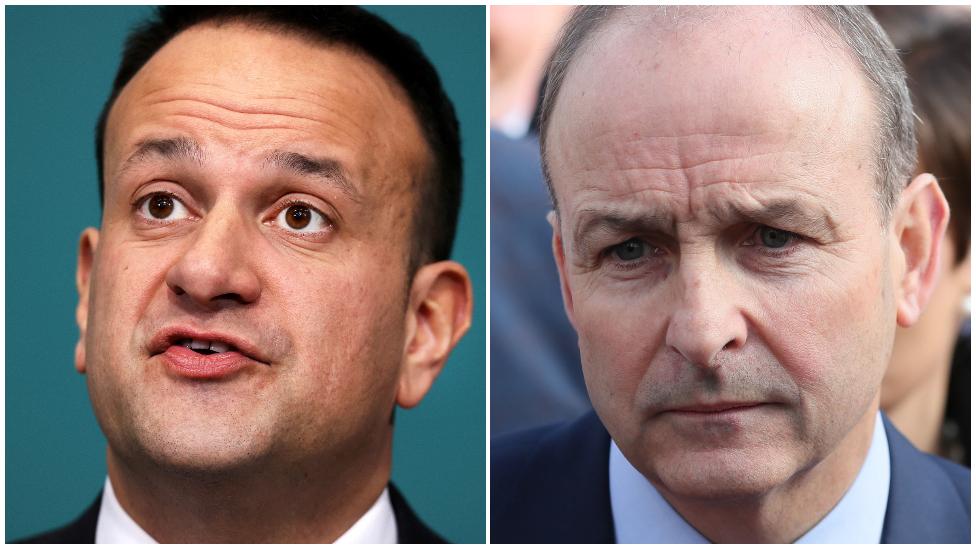Coronavirus: Irish parties 'hope to fill vacuum' amid outbreak
- Published

Leo Varadkar and Fianna FΓ‘il leader MΓcheΓ‘l Martin could be rotating taoiseachs if a new coalition is agreed
Emergency legislation to deal with the Covid-19 crisis is being debated at the Irish parliament on Thursday.
Politicians from across the political divide say they recognise the need for a stable government to replace the current caretaker one.
No party won a majority in February's general election.
Since then, the previous government, headed by Taoiseach (Irish prime minister) Leo Varadkar, has continued in a caretaker capacity.
Negotiations between Fine Gael, Mr Varadkar's party, and MΓcheΓ‘l Martinβs Fianna FΓ‘il proceeded at a relatively slow pace β until Wednesday night.
Both parties now say they agreed on "the need to form a strong stable government that will help Ireland recover post-Covid-19".
No majority
They have said they are "working to develop a programme for government that provides stability and a working majority in the DΓ‘ilβ.
But there is a problem - an Irish government must have at least 80 seats to secure a DΓ‘il majority.
In February's election, Sinn FΓ©in topped the popular vote and won 37 seats, while Fianna FΓ‘il ended up with 38 and Fine Gael with 35.
So the two parties have a combined vote of 72.
Ideally they would like the Greens and some independent TDs to come on board.
But so far the Greens, with 12 TDs (MPs) seem reluctant to do so, arguing that these emergency times require an emergency or national government.
Both Fianna FΓ‘il and Fine Gael, however, continue to rule out any arrangement with Mary Lou McDonaldβs Sinn FΓ©in, which won more votes in the general election than any other party.
Sinn FΓ©in, under leader Mary Lou McDonald, topped the popular vote in February's general election
There is now another practical reason to accelerate the government formation negotiations.
Thatβs because the current caretaker administration may soon not be in a position to pass emergency legislation to deal with the crisis.
For a bill to become law, it must pass both the DΓ‘il and the Seanad (upper house of the Irish parliament) before it is signed by the president.
Next week, counting will begin in the Seanad elections, but it will still be incomplete until the taoiseach (prime minister) nominates 11 senators to the 60 member body.
The DΓ‘il has not yet elected a taoiseach - and hence the uncertainty.
The rotating taoiseach
It is expected that the leaders of Fianna FΓ‘il and Fine Gael will rotate the role of taoiseach if β but more likely when β a new coalition is agreed.
So, it is not beyond the bounds of possibility that they can agree a taoiseachβs list of nominees.
The absence of a stable government in these emergency times is also concentrating minds beyond politics with some lawyers speculating privately about the implications of the political vacuum for the Republicβs planning laws.
It is a vacuum that Fianna FΓ‘il and Fine Gael hope will be filled relatively soon.